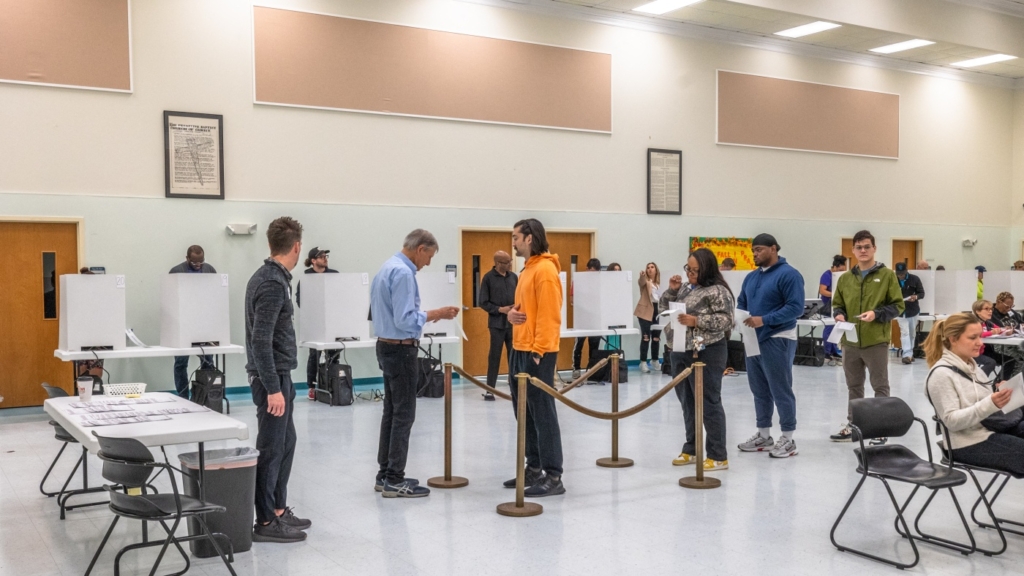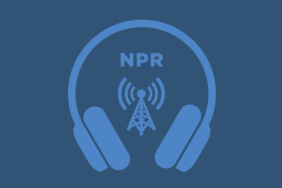Bu içerik, Kuzey Carolina’da seçmenlerin oy kullanmak için kimlik gösterip gösteremeyecekleri konusundaki uzun süreli tartışmayı ele almaktadır. 2024 başkanlık seçimlerinde bu gereklilik ilk kez büyük bir testten geçti. Kelle Pressley’in oy kullanırken kimliğini unutması ve sonrasında yaşadığı deneyim anlatılmaktadır. Ayrıca, Kuzey Carolina’da kimlik gerekliliğinin yasal süreci, siyasi ve ırksal etkileri ve bazı siyasi gelişmeler de ele alınmaktadır. Son olarak, kimlik gerekliliğinin seçim sonuçları üzerindeki etkileri ve gelecekte yapılması muhtemel değişiklikler hakkında bilgi verilmektedir. Bu içerik, kimlik gerekliliği konusundaki tartışmaları ve uygulamaları detaylı bir şekilde ele almaktadır.
[ad 1]
Kaynak: www.npr.org

People line up to vote at a polling station at Greater Mount Moriah Baptist Church in Charlotte on Nov. 5.
Grant Baldwin/AFP via Getty Images
hide caption
toggle caption
Grant Baldwin/AFP via Getty Images
CHARLOTTE, N.C. — For more than a decade, North Carolina has been home to a bitter back-and-forth over whether voters must show identification to cast a ballot in the swing state.
The requirement finally got its first major test in last month’s presidential election.
Overall, just a tiny fraction of people had their ballots rejected.
But critics say voter ID is still a solution in search of a problem, and they note that Black voters were more likely to have their ballots rejected than white voters.
Kelle Pressley of Charlotte was one of the voters nearly affected.
Pressley is a consistent voter, having cast a ballot 29 times since 2008, counting primaries and general elections. But when she came to vote on Election Day last month, she realized she didn’t have her ID.
“I change bags often, and I was thinking I had it on me, but I didn’t,” she said. “I still haven’t found it.”
Pressley said there was confusion at her precinct about her options.
She said poll workers urged her to go home and find her ID, instead of having her cast a provisional ballot and fill out an ID exception form, which allows voters to list a reason why they don’t have an ID. The reasons range from a voter lacking transportation to them losing their ID.
Pressley went home and called a voter protection hotline. She then came back to her precinct an hour before polls closed. She said this time poll workers allowed her to fill out the exception form and cast a provisional ballot. Her vote ultimately counted.
“Someone else would have … been like, ‘Forget about it, I’m not voting,’ ” she said. “‘Que sera sera, whatever will be will be.’ “
Only a fraction of votes rejected
Pressley was one of nearly 6,900 North Carolinians who came to vote without photo ID. Out of more than 5.7 million voters, that’s about one in every 830 voters who cast ballots.
Most of those people were able to cast a provisional ballot. County elections boards counted most of them and, in the end, just 1,670 people had their ballots rejected because they didn’t have ID. The rejection rate was one in every 3,400 voters.
But attorney Kathleen Roblez with the group Forward Justice, which has a pending lawsuit over the voter ID law, said that’s still too many people, considering in-person voter fraud has been found to be almost nonexistent.
And she said more people were probably impacted this year than show up in state data.
“So you really have no idea how many people saw all of the information about ID and said, ‘I can’t vote,’ ” Roblez said.
A long fight that’s still not over
Voter ID is required in 36 states, including the swing states of Georgia, Arizona and Wisconsin.
North Carolina’s fight over ID rules has lasted more than a decade.
Two years after Republicans gained control of the state legislature in 2011, GOP lawmakers passed a strict photo ID law.
The 4th Circuit Court of Appeals in 2016 overturned the law, ruling that Republican legislators targeted Black voters with “almost surgical precision.”
In 2018, lawmakers tried again. They placed a constitutional amendment on the ballot requiring photo ID. It was approved with 55% of the vote. It also had support from some Black lawmakers.
The legislature then passed a law to implement the amendment. The second photo ID law was more lenient than the 2013 version, allowing voters to use multiple IDs and to get a free ID from their county elections board. It also allowed people to cast provisional ballots so long as they list a reason for not having identification.
Six voters sued over the new law, along with the NAACP. In 2021, North Carolina judges struck down the law, saying it again discriminated against Black voters.
Allison Riggs, who is now on the state Supreme Court, was an attorney for the plaintiffs. She said that ruling shows “how the state’s Republican-controlled legislature undeniably implemented this legislation to maintain its power by targeting voters of color.”
But in 2023, the state Supreme Court — with a new Republican majority — said that photo ID could proceed. The requirement was in place for municipal elections that fall, and in the March 2024 primary. The November general election was photo ID’s first major test.
A small fraction of people had ballots rejected.
But there was a racial disparity. Black voters had 30% of the rejected ballots, despite being about 20% of the electorate.
“Black North Carolinians statistically lack the kind of IDs that would be approved,” Roblez said. “And they are also statistically more likely to have a hard time getting the other ID.”
Andy Jackson, with the conservative John Locke Foundation, said it’s important to note that the number of rejected ballots for each racial group was small. For Black voters, 502 people had their ballots rejected, compared with 622 white voters.
He said there will always be disparities among groups in any requirement.
“I don’t know if anyone ever expects any statistic to be exactly the same,” he said.
Changes coming?
Some North Carolina Republicans have questioned whether the state’s voter ID exception form undermines the purpose of the law.
But Jackson said he believes most Republicans want to move on.
“I don’t know how strict they want to go because I don’t know if they have an appetite for another lawsuit,” he said.
On Monday, GOP lawmakers advanced a new measure that would codify in the state constitution that photo ID is needed for voting by mail as well.
Photo ID wouldn’t have materially affected the state’s presidential race this year, which Donald Trump won by 183,000 votes.
But some contests were much closer, like a state Supreme Court race, where Riggs, a Democrat, went into a recount against her Republican opponent up by just 722 votes.










Yorumlar kapalı.